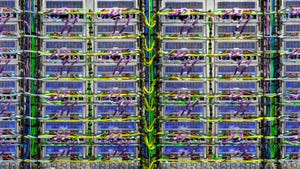Data Center Economics: Build vs. Buy
Does it make more sense to build your own data center, use a colocation center to house your gear, or lease turn-key space from a wholesale data center provider? Capital, control, speed to market and the size of the requirement are all key considerations in determining the best approach.
June 9, 2010
Does it make more sense to build your own data center, use a colocation center to house your gear, or lease turn-key space from a wholesale data center provider? The size of a requirement has historically been a key decision point in sorting out the economics of data center expansion. But capital, control and speed to market are also important considerations in determining the best approach, according to panelists at the Tier 1 Datacenter Transformation Summit last week in Reston, Va.
A significant number of enterprise companies still prefer to build their own data centers, usually out of a desire to control all aspects of their operation. Security is often a guiding principle for companies that build their own facilities. Many financial services firms build stand-alone data centers to ensure that their critical IT assets are not sharing space with other companies.
“We believe it’s economical for us to build our own data centers,” said Jeff Lowenberg of The Planet, a hosting provider with major operations in Houston and Dallas. “It’s also an issue of control. Nobody has our best interests at heart more than we do.”
Wholesale Benefits from Focus on Capital
The wholesale model, in which a developer leases finished plug-n-play data center space, is increasingly attractive to companies seeking 1 megawatt or more of data center capacity. One company that has made extensive use of wholesale space is Horizon Data Center Solutions of Dallas, which has expanded quickly by leasing space from Digital Realty Trust and Power Loft.
“It was really a CapEx issue and time-to-market issue,” said Lance Smith, the CEO of Horizon. “We are also concerned with the obsolescence of certain technologies in the data center sector.”
Wholesale space allows providers to avoid large up-front investments in data center construction, which typically can cost $1,000 to $1,500 for each square foot of finished space. With many companies seeking to conserve cash amid tight credit conditions, the wholesale model has gained favor.
Sticking to a Core Competency
For cloud storage provider Carbonite, colocation proved to be the right solution. “For us it’s more important to put money into our service,” said Kai Gray, director of operations at Carbonite. “We don’t want to be in the business of employing electricians or HVAC guys or taking care of generators.”
Carbonite has two large colocation footprints, Gray said. “We’re an anchor tenant,” said Gray. “What we give back (to the collocation provider) is well forecasted growth.”
Operators of multi-tenant data centers say a growing number of companies are becoming comfortable with outsourcing their IT operations. A study released this week by Savvis predicts the number of companies that outsource their IT infrastructure will increase globally from 17 percent today to 64 percent in 2020.
Market Maturity Boosts Outsourcing
“Five years ago, control and security were issues,” said Ali Moinuddin, Marketing and Communications Director of Interxion, a European provider of collocation and wholesale data center space. “The market has moved on. The colocation market has attracted critical mass. Organizations are getting more intelligent about how they split their IT between in-house needs and a third-party provider.”
Interxion has built 27 data centers in 11 markets across Europe. “We build on the proviso that other companies don’t want to build data centers,” said Moinuddin. “ It’s a clear benefit for people to come to us.”
After a turbulent period early in the last decade, customer comfort level has improved in recent years as the industry has matured. “Ten years ago, it was ‘will you still be around?” he added. “Now there are players that are very well-funded.”
Although IT managers are getting more comfortable with moving gear out of their company-owned data center, it’s often not going very far.
“I think people still want to be close to their equipment,” said Moinuddin. “They insist on being close to their equipment, and that’s largely driven by IT managers who want to be able to reach the data center in 30 minutes or less.”
Building in The Future?
Many companies mix and match the various data center service models. And some that are using colocation and wholesale space today will eventually be candidates to build their own facilities. Google, Microsoft and Facebook all leased third-party space to host their Internet infrastructure before deciding to build their own facilities. Several panelists at the Tier 1 event said they could eventually follow that trajectory.
“We might find the need to go to a powered shell model at some point,” said Smith of Horizon, who said he was tracking environmental regulation efforts with an interest in how “carbon tax” might affect the economics of the data center build vs. buy issue.
In other cases, the decision could be driven by technology questions. “We’re very concentrated around storage, which has unique cooling and power needs,” said Carbonite’s Gray. “The time will certainly come when we examine whether we can cool these better than our provider.”
Scale Supports Economics
Data center construction typically only makes sense if the company has a large requirement. At the Tier 1 event, Quality Tech CTO Simon Tusha asserted that it only made sense to build if you needed more than 30 megawatts.
While few set the bar quite that high, panelists expressed surprise that enterprise companies continue to build small data centers, such as a recent project that used economic stimulus funds to build a 2,000 square foot data center.
“Which board in their right mind would sanction such a project?,” asked Moinuddin. “There’s a whole host of providers who can meet your requirement today.”
About the Author
You May Also Like

.jpg?width=300&auto=webp&quality=80&disable=upscale)





